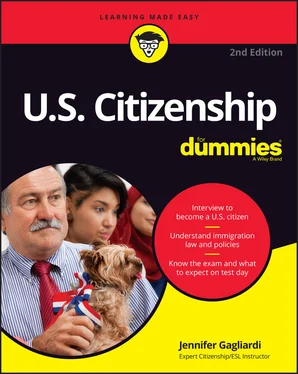Jennifer Gagliardi - U.S. Citizenship For Dummies
Здесь есть возможность читать онлайн «Jennifer Gagliardi - U.S. Citizenship For Dummies» — ознакомительный отрывок электронной книги совершенно бесплатно, а после прочтения отрывка купить полную версию. В некоторых случаях можно слушать аудио, скачать через торрент в формате fb2 и присутствует краткое содержание. Жанр: unrecognised, на английском языке. Описание произведения, (предисловие) а так же отзывы посетителей доступны на портале библиотеки ЛибКат.
- Название:U.S. Citizenship For Dummies
- Автор:
- Жанр:
- Год:неизвестен
- ISBN:нет данных
- Рейтинг книги:3 / 5. Голосов: 1
-
Избранное:Добавить в избранное
- Отзывы:
-
Ваша оценка:
- 60
- 1
- 2
- 3
- 4
- 5
U.S. Citizenship For Dummies: краткое содержание, описание и аннотация
Предлагаем к чтению аннотацию, описание, краткое содержание или предисловие (зависит от того, что написал сам автор книги «U.S. Citizenship For Dummies»). Если вы не нашли необходимую информацию о книге — напишите в комментариях, мы постараемся отыскать её.
U.S. Citizenship For Dummies
U.S. Citizenship For Dummies
U.S. Citizenship For Dummies — читать онлайн ознакомительный отрывок
Ниже представлен текст книги, разбитый по страницам. Система сохранения места последней прочитанной страницы, позволяет с удобством читать онлайн бесплатно книгу «U.S. Citizenship For Dummies», без необходимости каждый раз заново искать на чём Вы остановились. Поставьте закладку, и сможете в любой момент перейти на страницу, на которой закончили чтение.
Интервал:
Закладка:
After your interview, you’ll get a USCIS Form N-652, which simply tells you whether your application was granted, denied, or continued. Here’s an explanation of what each of these three possibilities means:
Granted: Congratulations! If your application was granted, you’ll soon receive a notice of when and where to go for your swearing-in ceremony, where you’ll take the Oath of Allegiance. You don’t become a U.S. citizen until you attend this ceremony and take the Oath of Allegiance.
Denied: If the USCIS denies your application for naturalization, you’ll receive a written notice telling you why. If you feel you were wrongly denied, you can ask for a hearing with another USCIS officer to appeal your case. On the back of your denial letter, you’ll find USCIS Form N-336 “Request for Hearing on a Decision in Naturalization Proceedings.” You’ll also conveniently find full instructions on how to file and what fees you’ll need to pay. If your application is again denied at your second hearing, don’t give up — you still have one more chance: You can file to have your application reviewed in U.S. district court. Keep in mind that you only have 30 days after receiving your denial letter to file for an appeal hearing. After 30 days, the case is considered closed, and you’ll have to start the entire process over again if you want to reapply.
Continued: Cases are most often continued, or put on hold, because the applicant didn’t provide all the documents the USCIS needed or because the applicant failed the English or civics test. If the USCIS requires more information, they will give you a Form N-14, which explains exactly what information or documents they’re looking for. The form will also tell when and how you should provide these papers. You’re close to gaining citizenship, and details count. Follow the instructions on Form N-14 carefully. Not paying attention to details can result in your application being denied. If you don’t understand the instructions, ask for help and make sure that you deliver what’s asked for on time. (See Chapter 7for information about finding competent and ethical help.)If you failed the English test and/or the civics test, the USCIS will give you a time to come back and try again in another interview. Study hard, because if you fail the tests a second time, your application will be denied. Don’t worry — you’ll have plenty of time to prepare for your second test (usually between 60 and 90 days).
Recognizing Permanent and Temporary Bars to Naturalization
Are there any situations in which you can be automatically disqualified from ever becoming a U.S. citizen? You bet. Having committed certain crimes may cause you to lose your chance at citizenship — these are known as permanent bars to naturalization. A murder conviction on your record is a permanent bar to naturalization. If you were convicted of an aggravated felony that was committed on or after November 29, 1990, you’ve also lost your chance of becoming a U.S. citizen.
Other crimes are temporary bars to naturalization , meaning you must wait a designated time after committing the crime before you can become eligible to apply for citizenship. In Chapter 8, you can find out more about other ways you can be disqualified for citizenship.
 DISABILITY AND AGE EXCEPTIONS TO THE ENGLISH AND CIVICS REQUIREMENTS
DISABILITY AND AGE EXCEPTIONS TO THE ENGLISH AND CIVICS REQUIREMENTS
In order to accommodate those with disabilities, certain applicants — those with a physical or developmental disability or mental impairment — may not be required to take the English and/or civics test. If you think you, or an immigrant you are assisting, may qualify for these exceptions, be prepared to file USCIS Form N-648 “Medical Certification for Disability Exceptions” along with the naturalization application. Don’t send in the application until a licensed medical or osteopathic doctor or licensed clinical psychologist with knowledge of the case has completed and signed Form N-648. If you qualify for the English language proficiency portion of the test, be prepared to bring a qualified interpreter with you to your interview.
When it comes to gaining U.S. citizenship, age has its privileges in the form of easier English and/or civics test requirements:
If you are over 50 years old and have lived in the United States as a lawful permanent resident for periods totaling at least 20 years, you won’t have to take the English test. You will, however, be required to take the civics test in the language of your choice.
If you are over 55 years old and have lived in the United States as a lawful permanent resident for periods totaling at least 15 years, you won’t have to take the English test. You will be required to take the civics test in the language of your choice.
If you are over 65 years old and have lived in the United States as a lawful permanent resident for periods totaling at least 20 years, you won’t have to take the English test. You’ll also be given a simpler version of the civics test in the language of your choice.
You must meet the age and permanent residency requirements at the time you file your Application for Naturalization in order to qualify for an age exception. Your time as a permanent resident need not be continuous, but it must total a period of at least 15 or 20 years. (We cover this topic in more detail in Chapter 4.)
 Failure to pay child support or support other legal dependents can present a bar to naturalization. Make sure that your legal financial obligations to any dependents are current and up-to-date before applying for citizenship.
Failure to pay child support or support other legal dependents can present a bar to naturalization. Make sure that your legal financial obligations to any dependents are current and up-to-date before applying for citizenship.
Attending Your Swearing-In Ceremony
Assuming you pass your interview, you’ll receive a notice of when to attend your swearing-in ceremony, where you’ll take the Oath of Allegiance. (In some cases, the interviewing officer will give you the oath on the spot, and you’ll become a naturalized citizen then and there, but most often you’ll return another day for a ceremony.)
The Oath of Allegiance plays an important part in becoming a U.S. citizen, and it carries serious implications. The oath serves as your solemn promise to the government of the United States that you
Give up loyalty to other countriesYou may still have feelings of respect and admiration for your former homeland. You may even have family and friends still living there. However, in order to take the oath, your government loyalty must be to the United States and only to the United States.
Defend the Constitution and laws of the United StatesYou promise to protect the Constitution and all laws from all enemies, from other countries, or from inside the United States.
Obey the laws of the United StatesYou promise to obey the Constitution, follow the rule of law, and support human rights.Be loyal to the United StatesYou promise that your allegiance is to the United States only.
Serve in the U.S. military (if needed)You promise to use a weapon as a member of the U.S. military to protect the country's safety and security (if the U.S. government asks you to do so).
Serve (do important work for) the nation (if needed)You promise to do other non-military work that is important to the country's safety and security (if the U.S. government asks you to do so).
Promise to keep the Oath of AllegianceYou solemnly and freely promise to exercise rights and responsibilities of U.S. citizenship.
Taking the Oath of Allegiance is also known as Attachment to the Constitution. In this case, the word attachment means loyalty or allegiance.
Читать дальшеИнтервал:
Закладка:
Похожие книги на «U.S. Citizenship For Dummies»
Представляем Вашему вниманию похожие книги на «U.S. Citizenship For Dummies» списком для выбора. Мы отобрали схожую по названию и смыслу литературу в надежде предоставить читателям больше вариантов отыскать новые, интересные, ещё непрочитанные произведения.
Обсуждение, отзывы о книге «U.S. Citizenship For Dummies» и просто собственные мнения читателей. Оставьте ваши комментарии, напишите, что Вы думаете о произведении, его смысле или главных героях. Укажите что конкретно понравилось, а что нет, и почему Вы так считаете.












